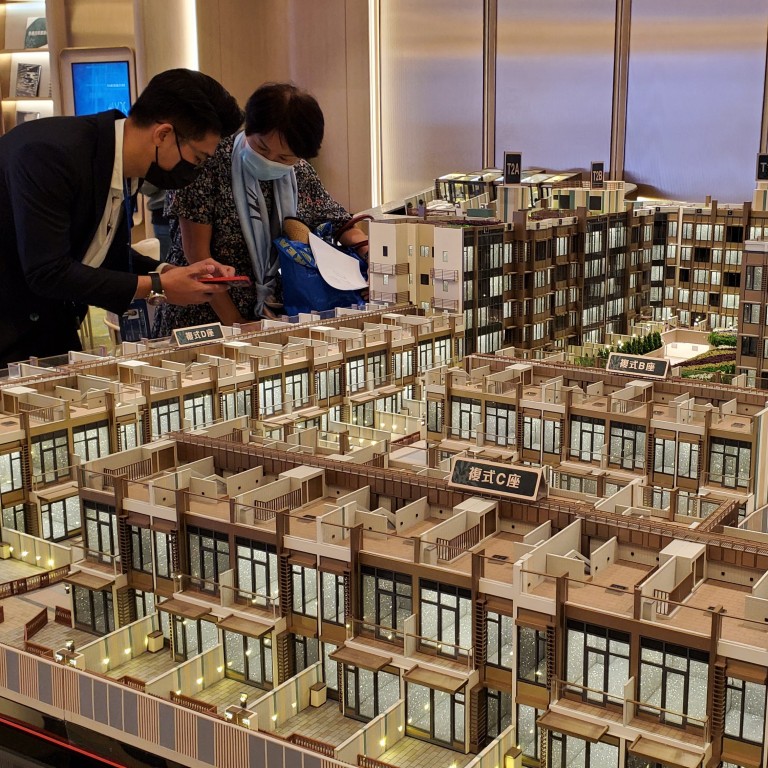
Budget 2022-2023: Hong Kong opens funding tap to make more mortgage loans available for first-home buyers, dealing a blow to ‘nano flat’ builders
- The available mortgages on homes with a loan-to-value ratio of 80 per cent will increase to between HK$10 million and HK$12 million in the fiscal 2022/23 budget
- First-home buyers who qualify for the higher loan-to-value ratio of 90 per cent can borrow between HK$8 million and HK$10 million, more than the previous HK$8 million
Hong Kong’s government will raise the amount of mortgages available in home loans to help more residents in the city’s pandemic-stricken economy get on the property ladder and forestall a market slump.
First-home buyers who qualify for the higher loan-to-value ratio of 90 per cent can borrow up to HK$10 million in mortgage financing, more than the previous maximum of HK$8 million, according to the plan.
“Some buyers would shift to buying bigger flats at a higher price” because of the financing available, “which will provide developers with the incentive to build larger flats,” said Nelson Wong, head of research at JLL in Greater China.
The relaxation of financing may double the number of lived-in homes sold, those priced between HK$10 million and HK$12 million, to 6,600 units this year, from 3,319 last year and 2,124 in 2020, said Midland Realty’s residential division chief executive Sammy Po, adding that he was surprised by the policy.
Hong Kong’s love of shoebox abodes has ended as quickly as it began
Three in four respondents polled by Hong Kong Property Services (Agency) said they believe they would benefit from the government’s budget, with one fifth of the 473 surveyed said the relaxation of the mortgage cap is helpful.
Centaline Property Agency said the turnover of homes worth between HK$8 million and HK$19.2 million would jump 30 per cent. The policy can help speed up homebuying decisions and increase the number of buyers by 20 to 30 per cent.
On a HK$12 million home, the down payment will drop to HK$2.4 million under the new policy, from the previous HK$6 million.
Demand will be channelled towards larger homes such as three-bedroom flats, while a reversal in the price surge will be seen in the tiniest abodes, said Raymond Chong, founder and chief executive of the mortgage broker StarPro Agency.
“Gains for mid-sized units are expected to increase,” said Chong. “The cheaper nano-flats and subdivided flats will find it difficult to follow the rise of the market and may underperform in the future.”
To be sure, a higher loan-to-value ratio will increase the income requirement in the stress test, as lenders must raise their bars to recalibrate the risks with the higher financing.

To qualify for loans in a HK$12 million home, the monthly income must be at least HK$90,000 for a 30-year mortgage with a loan-to-value ratio of 80 per cent. Monthly instalments, including the premium needed for mortgage insurance, could add up to HK$40,000. The previous income bar was HK$57,000 with a cap of 50 per cent.
Since mortgage insurance companies are more rigorous than banks, borrowers must have stable and continuous income sources, which makes it difficult for the self-employed and commission-based earners to qualify.
Home sales slowed significantly this year in Hong Kong’s secondary market. Lived-in homes in the price range of between HK$6 million and HK$10 million had the biggest drop as of mid-February, declining 30.3 per cent from the same period last year to 1,835 transactions.
About 2.5 per cent of Hong Kong’s 1,018 transactions involving lived-in homes last year recorded a net loss, 50 basis points higher than the 2 per cent recorded in 2020, according to data compiled by Ricacorp Properties.
The new policy may also encourage buyers to switch to bank loans, eschewing the mortgage financing provided by developers.
The Hong Kong Mortgage Corporation offers insurance for mortgages with a loan-to-value ratio of 50 to 80 per cent for homes worth HK$12 million to HK$19.2 million, though the loan will be capped at HK$9.6 million, said Eric Tso, chief vice-president at mReferral Mortgage Brokerage Services.
Last year, the amount of loans drawn with mortgage insurance soared to a record HK$132.558 billion, and 23,846 cases, Tso noted. This reflected the considerable demand for mortgages with high loan-to-value ratio, he said.

